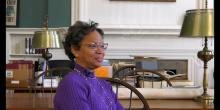
Bernadette Whitsett-Hammond
Lane High School, Burley High SchoolPhyllis Leffler: What do you remember about this play that got put on, I think that she wrote or wrote in conjunction with students and that led --
Bernadette Whitsett Hammond: That was --
Phyllis Leffler: -- at the end, to --?
Bernadette Whitsett Hammond: Oh, okay. I understand. I recall that, but that was a young -- I think I was in my sophomore year when this happened, and I wasn’t in it, but, of course, I attended the production. And it was a Black history play that she had spearheaded, and the students -- especially, I would say, the upper level students, the juniors and the seniors -- were very excited about doing something like that. They’d not been involved in anything like that before. And I don’t recall anything controversial about it. However, it was viewed that way by some of the white staff and white students. I do recall, at the end, which is traditional for African American people to sing the Negro National Hymn, Anthem. And, at the end, that was part of that program, that we were to stand and sing that, and some white students walked out, and that enraged a lot of the Black students because we were never allowed to walk out of the auditorium until we were dismissed. And it appeared that they were able to walk out, and no repercussions and whatever. So, what happened as a result of that, the Black students protested, and they took over the whole auditorium, and they stayed in the auditorium, I think, at least a week.
Phyllis Leffler: A week?
Bernadette Whitsett Hammond: I think it was about a week before this -- oh, you know, this was a major issue. This was a major issue in town, and all kinds of -- Mr. Eugene Williams, Reverend [Mitchell?], all of these people got involved in this because they had to figure out how they were going to resolve this problem because it was just very -- it was a major incident.
Phyllis Leffler: So, students didn’t go to class --
Bernadette Whitsett Hammond: [Right?].
Phyllis Leffler: -- while they were -- and they left at the end of the day, and came back, and walked into the auditorium? They didn’t stay overnight, I’m assuming.
Bernadette Whitsett Hammond: No, didn’t stay overnight, but did not go to class all day. And I felt a lot of pressure as a student whose mother worked there, and I can recall this very clearly. Knowing what happened was wrong, that that should not have been allowed, the students should not have been allowed to walk out, and, if they did walk out, there should have been some type of repercussions for them. So, I went to my mother, along with several of my best friends who were in that picture that you showed me, and I said, ”Mom, I just don’t know what to do. I don’t feel that this was right. I want to support.” And so, my mother said to me, ”You follow your heart.” So, I went to my algebra teacher, Mr. [Farmwell?], and I said to him, ”I’m sorry, Mr. Farmwell. I will not be in your class today.” Got my books. All my girlfriends did the same thing. They went to their teachers. And we went in, and sat in the auditorium, and participated in the protest as well.